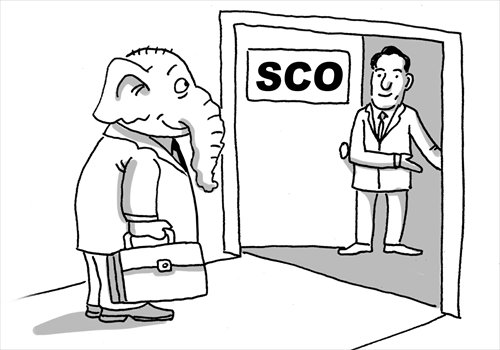India joining SCO creates forum for peace

Illustration: Liu Rui/GT
The Shanghai Cooperation Organisation (SCO) is set to confer full membership to India in its coming 14th summit at Ufa in Russia next week, according to Indian media reports. India was inducted as an observer at the 2005 Astana summit.
This is the first time in its history of 15 years that the SCO will expand its membership. In view of its success as a regional organization, the SCO's previous lack of expansion has been an enigma to most experts.
The SCO is celebrated for presenting robust alternative strategies and paradigms via its policy initiatives. Perhaps its success partly explains why the SCO was sensitive about inviting other nations into this very compact grouping.
Comparisons are often drawn with the North Atlantic Treaty Organisation which expanded from 16 members to 28 since the early 1990s, though as a Cold War relic it should have disappeared just as its counterpart Warsaw Pact did.
However, the SCO is not modeled on Western military alliances, which makes it a perfect fit for India's nonalignment policy.
The SCO was originally conceived in 1996 as the Shanghai Five - China, Russia, Kazakhstan, Kyrgyzstan, Tajikistan - a forum for building trust and peace and to facilitate the demarcation of borders of China and Russia and these three newly independent Soviet republics.
The Shanghai Five added Uzbekistan and was reborn as SCO on June 15, 2001. This shifted its focus to larger regional issues of prosperity, energy security, connectivity and to countering threats from separatism, extremism and terrorism.
This expansion of focus makes India a very willing and deserving aspirant candidate for SCO membership. Given India's strong enduring ties with all these countries and that the same issues have engaged Indian elites for really a long time, New Delhi has been seeking full membership for all these years.
However, it was China's green light during Indian Prime Minister Narendra Modi's China visit this May, especially the mention of "SCO membership" in their joint statement, that enabled SCO Foreign Minister's Council early June to put this item in their proposed agenda for the Ufa summit.
The formal acceptance of India as a full member, even in principle, has deep political symbolism for both sides. Other than the fact that the SCO has, over the years, come to be known for its strong alternate visions on several global and regional themes and created powerful trends in trade and energy flows, granting India full membership will surely give a boost to its closer engagement with the SCO and also facilitate India's participation in regional decision-making.
Given that Pakistan is also being conferred full membership of the SCO, it will be an excellent forum for India and Pakistan to deliberate at the highest level on critical issues like countering terrorism, and break ice on bilateral issues on the sidelines. It's reported that there is a possibility of a meeting between Modi and his Pakistani counterpart Nawaz Sharif on the sidelines of the Ufa summit with an aim to move forward and normalize ties. Besides, after the International Security Assistance Force exit from Afghanistan, the SCO is widely expected to play a critical role in ensuring regional peace and stability. Given India's strategic interests and its heavy investment in that country, India clearly has major stakes in this transition and would like to be part of any SCO initiatives.
India will surely be a valuable addition to the SCO in contributing to its deliberations and burden sharing in countering terrorism, building connectivity, energy security and prosperity. India would especially benefit from joining SCO anti-terrorism exercises. It will also enable India to balance its growing closeness to the US and its friends and allies and further strengthen its historical links with the Silk Road network which seems to guide Modi's follow-up visits after the summit in Ufa to the five Central Asian countries.
The author is professor at School of International Studies, Jawaharlal Nehru University, New Delhi. opinion@globaltimes.com.cn